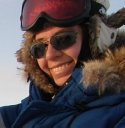I am writing this blog because today, October 14th, is the first Open Access Day.
This day is an open invitation to think over the ways in which we share our knowledge. This blog is my own, personal reflection on how I first became involved almost 10 years ago.
I studied Biology during the late 90's in the National University of Colombia, my hometown country, and I loved it. Full of endless surprises, so many things about living beings that you could not imagine, from the beautiful molecular structures to the fact that living beings actually evolve.
.. the beautiful molecular structures! ... I wanted to learn more about them. So I started reading.
The more general papers were easy to find, just a short trip to the library being required. However, from time to time it happened that I learned about this AWESOME thing that proteins can do... like being able to preserve the size of our chromosomes by adding over and over the same sequence at the end.
Wanting to learn more about it, I used to ran back to the library with the references in my hand, just to discover -to my disappointment- that THAT particular journal was not available. NEITHER that other one. NOR that one. Getting particular pieces of information about specific research was getting difficult for a college student like me.
Anyway, time passed by and, being the resources for experimental research in molecular biology limited in my country, I decided to focus my work on theoretical biology.
Then I learned that theoretical biology requires a lot of reading. And that many papers whose titles seemed provocative were just... unavailable. Papers describing the latest discovery were unavailable, papers describing very old experiments that could give me an historic perspective were unavailable, papers published in very specific journals were unavailable.
I was feeling uncomfortable. How were we going to think about Biology, how were we going to create links between apparently unrelated facts, develop more unified theories, deal with the huge amount of newly produced information, tell the people about the beauty of nature, if the information seemed to be kept away from the people willing to think, create, develop, deal with, communicate? Is information still "information" when it is kept locked, not being communicated?
In those days I also learned that I was not the only one feeling uncomfortable with that situation. People around the world was having the same doubts, and I joined them in one of the first initiatives by signing this Open Letter. I did not believe my name was going to make a big difference, me a college student in a small country. But I did sing it anyway because those were the principles I believed in.
Time kept passing by and nowadays I do not think about Open Access as often as I should.
Fortunately, there are days like today, where I can sit down and remember that I still believe that the society, from the academic to the artist to the everyday person, has the right to nurture itself with the scientific knowledge that is being produced. That I still believe that the information that is not shared has less chances to survive, because information needs to be integrated in the wider web of knowledge, a process that may require the interaction of all of us.
Fortunately, there is also people around me to remind me about this.
Thanks for reading.
P.S. I first read about the Open Access Day here
Subscribe to:
Post Comments (Atom)


No comments:
Post a Comment